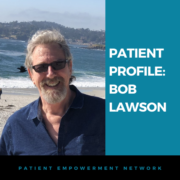What Is the Role of Immunotherapy for Non-Melanoma Skin Cancers?
What is the Role of Immunotherapy for Non-Melanoma Skin Cancers? from Patient Empowerment Network on Vimeo.
What should non-melanoma skin cancer patients know about immunotherapy? Expert Dr. Silvina Pugliese explains common situations when immunotherapy is used and updates about immunotherapy treatment and research.
Silvina Pugliese, M.D., is a Clinical Assistant Professor of Dermatology and Attending Physician at the Stanford Medicine Outpatient Center and Stanford Cancer Institute. Learn more about Dr. Pugliese.
[ACT]IVATION TIP
“…recognizing that immunotherapy can be utilized in certain cases when we consider a systemic treatment of cutaneous squamous cancer and basal cell cancer. As a whole, immunotherapy is not currently first line treatment, but utilized when there is a high risk tumor or whether it’s metastatic disease or where there is locally advanced disease.”
Download Guide | Download Guide en español
See More from [ACT]IVATED Non-Melanoma Skin Cancer
Related Resources:

|

How Do Non-Melanoma Skin Cancers Impact Non-White Populations? |

Occupational Exposures and Non-Melanoma Skin Cancer | Understanding Risk Factors |
Transcript:
Mary Leer:
Dr. Pugliese, what is the role of immunotherapy in patients with non-melanoma skin cancers, specifically those whose cancer is in an advanced stage or in their first line of treatment?
Dr. Silvina Pugliese:
Immunotherapy is used in non-melanoma skin cancers in certain specific scenarios. First, PD-1 is a receptor that inhibits the activity of a sub-type of T-cells, this inhibition inhibits the, controls I could say the immune response, which is helpful because in exuberant and immune response can sometimes contribute to auto-immunity. However, cancer cells can unfortunately hijack this mechanism to suppress an anti-tumor response. So the immunotherapy we will be discussing today are monoclonal antibodies against PD1, and they work by encouraging and an anti-tumor response. And before diving into immunotherapy and when it is used, I first want to say that for most cutaneous squamous cell cancers and most cutaneous basal cell cancers, which are very different entities, but most of them can be treated by surgical excision or mohs micrographic surgery. In certain subtypes of both types of tumors, they can even be treated by topical medications, including topical chemotherapy and topical immunotherapy, so the cases where we think about more aggressive treatments are usually higher risk and more advanced and also unable to be treated with surgery or the other modalities mentioned. So in the case of cutaneous squamous cell cancer, the two FDA-approved PD-1 inhibitors that are used for treatment of continuous squamous cell cancer are pembrolizumab (Keytruda) and cemiplimab (Libtayo), some scenarios in which these PD1 inhibitors can be used are in the treatment of locally advanced cutaneous squamous cell cancer, not curable by surgery or radiation, as well as metastatic cutaneous squamous cell cancer.
For basal cell cancer, the FDA-approved treatment is cemiplimab. This is utilized for patients who have locally advanced or metastatic basal cell cancer that was previously treated with a hedgehog inhibitor or whom a hedgehog inhibitor is not appropriate. I should mention that immunotherapy is currently not first-line treated for either cutaneous squamous cell cancer or cutaneous basal cell cancer. Now because I mentioned hedgehog inhibitors, I wanted to say that this is another systemic treatment option that is utilized for more aggressive, locally advanced or metastatic high-risk basal cell cancer. Hedgehog inhibitors work by inhibiting a receptor called smoothened, and this inhibition also inhibits tumor growth. And again, these hedgehog inhibitors are utilized for local high-risk basal cell cancer, there’s a positive margin after mohs micrographic surgery, residual cancer after multiple excisions and can be primary treatment if radiation or surgery is not possible due to the size of the tumor, these can also be utilized for locally advanced or metastatic basal cell cancer, which can’t be treated topically, surgically or with radiation, because those treatments would not be curative in those cases. The two FDA-approved hedgehog inhibitors are vismodegib and sonidegib, my activation tip for this section is recognizing that immunotherapy can be utilized in certain cases when we consider a systemic treatment of cutaneous squamous cancer and basal cell cancer. As a whole, immunotherapy is not currently first line treatment, but utilized when there is a high risk tumor or whether it’s metastatic disease or where there is locally advanced disease.
Share Your Feedback:
Create your own user feedback survey










